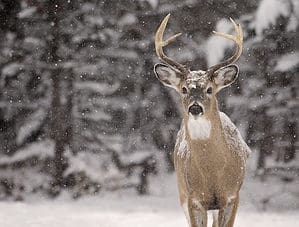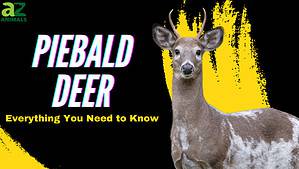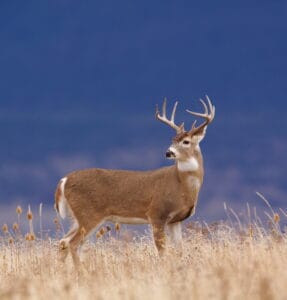Deer season in Connecticut runs from the end of September through January. However, this significant season is divided into several smaller seasons. You’ll need the correct permit to hunt in your preferred season and the correct weapon.
For instance, Connecticut deer season can be divided mainly into Archery season, State Lottery season, Private Land Shotgun/Rifle/ Revolver season, and several others. Furthermore, some of these seasons require lottery participation, while others do not.
The bag limit also varies widely based on the season. Sometimes, you’re allowed to hunt only one deer of either sex. Other times, the specific sex is laid out.
Hunting License Requirements
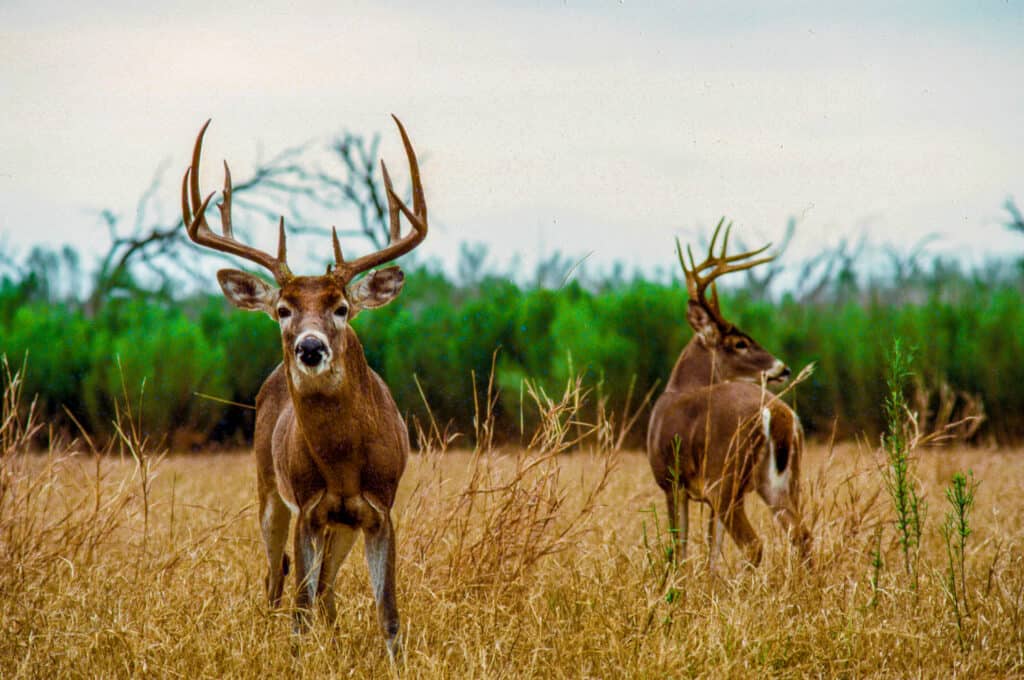
A firearms deer hunting permit does not require any further education.
©iStock.com/Dan Richards
You can purchase hunting licenses anytime on DEEP’s Online Outdoor Licensing System. You may also purchase them at specific town halls and equipment retailers. However, online is the preferred option.
If you purchase a license online, you can sign it digitally. Then, you can keep the signed copy on your phone instead of carrying a physical copy. However, purchasing at an agent location requires carrying a physical copy.
The cost does differ depending on whether or not you’re a resident. Residents aged 12 to 17 may apply for discounted stamps and permits. However, residents aged 12 to 15 must purchase a Connecticut Migratory Bird Conservation Stamp.
For a hunting license, you must complete the Connecticut Conservation Education/Firearms Safety course (or an equivalent from another state). You can complete much of the course online. However, you must also attend a field day.
If you’re over 65, you can get a free license when you meet the educational requirements. You must renew these licenses every year, though.
Landowners require a Free Landowner Deer Permit. While this is free, it is required.
Archery permits require the completion of a bowhunting course. You may take one inside Connecticut or an equivalent in another state. You must submit the course yearly; a previous archery permit is insufficient.
A firearms deer hunting permit does not require any further education. However, you must hold a firearms hunting license (which does require education). You can sign up for either a lottery permit or a non-lottery permit. If you do not get chosen in the lottery, you can later sign up for the non-lottery permit.
You can use a revolver for hunting instead of a shotgun or a rifle. However, an additional “endorsement” is required for a small fee.
Deer Season Types
Connecticut divides its deer season into multiple unique deer seasons. These seasons include archery, archery-only lottery, state land shotgun (which also includes lottery and non-lottery), private land shotgun/rifle/revolver, landowner, and muzzleloader.
Each season has its own regulations and requirements. Some seasons require a lottery, while others are open to anyone with the appropriate permits.
To participate in the archery deer seasons, the hunter must have a license and a Small Game and Deer Archery Permit. To participate in a firearms season, the hunter must have a Firearms Hunting License and a separate permit for their chosen weapon.
Hunting with a revolver requires the most amount of permits. Hunters must have a Firearms Hunting License, Private Land Shotgun/Rifle Deer Permit, and a Revolver Deer Endorsement. Hunting with a revolver can only be done on private land.
Season Type Regulations
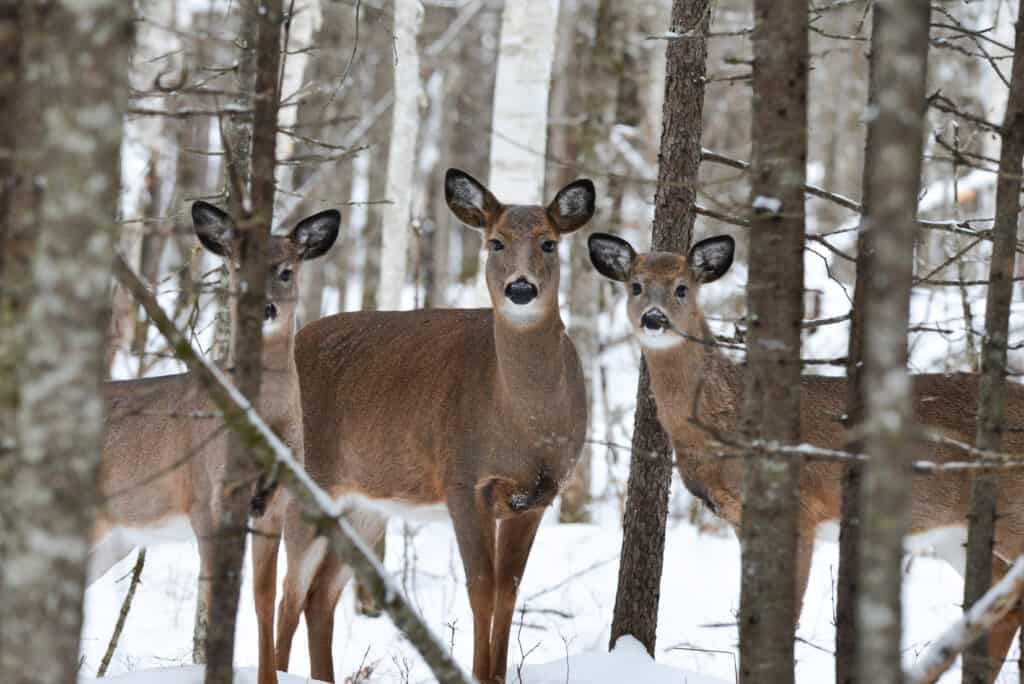
To participate in the archery
deer seasons
, the hunter must have a license and a Small Game and Deer Archery Permit.
©Rebecca C. Photography/Shutterstock.com
There are several deer seasons. They all have different regulations that need to be followed. Therefore, it’s important to understand when certain deer seasons start and what they allow. Seasons do not usually run concurrently.
Archery Season
Archery season on state land runs from late September to early November and again in late December. You can also hunt throughout September, November, and December with a bow (though the dates vary year-to-year). Private land hunting varies, but it usually extends out of these times.
You can bag two deer of “either sex” and two antlerless. When hunting on private lands in some zones, you can bag an additional deer of each sex in January. Hunting can occur 1/2 hour before sunrise and until sunset.
You can use long, recurved, and compound bows. Each must have a minimum 40-pound draw weight. You can also utilize mechanical spring-release devices. The projectiles cannot be coated with any substances.
You can use crossbows, as well. Their draw weight must be at least 125 pounds. It must have a permanently fixed rifle stock and a safety device (a safety switch). You can use adjustable stocks, but not folding ones. The bolt must be at least 18 inches. Scopes are allowed.
Arrowheads must have two different blades and be at least 7/8 inches wide.
You cannot possess a firearm while hunting during this season. Certain areas only allow bowhunting, so be sure to check. Decoys can be used during certain periods of this season. However, they must be covered with hunter-orange during transport.
Archery-only Lottery Season
Some lottery seasons are only archery. You must purchase an archery-only lottery permit to participate. All weapons that were legal during the regular bow season are legal during this season, as well. You may bag two of either sex and two antlerless during this season.
State-Land Lottery Season
There are several areas labeled as “Controlled Hunt Areas.” These require a lottery to hunt in. The number of deer available varies from area to area. It depends a lot on where you’re hunting.
Furthermore, this is divided into two different seasons. “A” season and “regular” lottery season. “A” season is the shortest – usually lasting only a few weeks.
You can hunt for 1/2 hour before sunrise and until sunset during this season.
Legal weapons include shotguns only. They may be 12, 16, or 20 gauge. You cannot use a shotgun capable of carrying more than three shells. However, rifled and smoothbore barrels are allowed.
State Land No-Lottery Deer Hunting
You can also hunt in some areas without a lottery. The laws in these areas are very similar to the lottery areas. The bag limit is typically one of either sex, though this can vary. The weapons allowed are the same as above.
However, you can often hunt with muzzleloaders, Shotgun converters, and telescoping sights are permitted in the non-lottery seasons.
There are also various training days for junior hunters. These days have special restrictions and typically occur on the weekend.
Only certain areas are “open” during this season, so be sure to check.
Private Land Shotgun/Rifle/Revolver Deer Hunting
Hunting on private land can be done from late November through early December. The bag limit depends on the area. In some cases, you can get one of either sex. In other cases, you can get either sex or two additional antlerless. It depends a lot on the zone, so be sure to check.
Hunting may occur 1/2 hour before sunrise and until sunset.
You can use a shotgun, rifle, and revolver (though this latter option requires a special endorsement). However, the exact legal weapons depend on how many acres the landowner has. For instance, you must have at least ten continuous acres to use a rifle or a revolver.
For others hunting on private lands, you must have signed written consent on an official form. Carry this with you when you are hunting.
Landowner Deer Hunting
During this season, landowners with more than 10 acres of continuous land may bag up to two deer. One can be either sex, but the other must be antlerless. While landowners can purchase a permit, spouses, descendants, parents, grandparents, and siblings may also purchase a permit.
However, you can only hunt on Sundays only.
Furthermore, the legal weapons include everything above, including rifles, revolvers, shotguns, and muzzleloaders. Bows are also allowed following the same rules as above.
State Land Deer Muzzleloader Season
During certain times in December, you may also hunt on state land with a muzzleloader or shotgun. The bag limit is only one of either sex, though, and not all areas have hunting open at this time.
Telescoping sights and shotgun converters are allowed.
A muzzleloader is anything that requires the powder and projectile to be loaded through the muzzle.
Private Land Deer Muzzleloader Season
You may also hunt on private land using a muzzleloader for slightly longer than on state land. Usually, this season extends throughout December. Different zones have different bag limits. Some allow one deer of either sex, while others allow for additional antlerless to be taken. Be sure to check depending on where you live.
All previous considerations for muzzleloaders apply for this reason. Telescoping sights and shotgun converters are allowed. You also do not need a minimum acreage for a muzzleloader.
Carry a signed consent form if you are not the landowner but have permission to hunt on private land. You may be asked to show this to prove that you have the right to hunt on that land.
Overall Regulations and Safety
There are many things to consider when hunting in Connecticut. While each season has separate requirements and restrictions, some overall regulations apply. This is not a complete list (as that would lead to a very long article). However, here are some of the most important things to keep in mind:
- Hunting on Sundays is generally not allowed. However, some exceptions exist, such as hunting on private land in some cases.
- Deer Management Zones 2 and 4A are more restrictive than other areas. “Antlerless Only” tags are not valid in this area, as they only allow one of either sex.
- For “proof of hunting,” possession of a loaded hunting implement while in an area where you may take wildlife is all that’s needed. Therefore, do not carry loaded implements in these areas when hunting isn’t allowed.
- You may not hunt when under the influence or impaired.
- Of course, shooting at people, buildings, or domestic animals is not allowed. You cannot shoot or hunt from a public road, either.
- Use of all-terrain vehicles on state land isn’t allowed except in special circumstances (for those with a disability). Hunting and shooting from any vehicle are also prohibited.
- Electronic calling devices can be used to hunt deer.
- Hunting is prohibited in Westport at any time.
- There are special restrictions on certain weapons, as we have discussed above. Check the regulations for your specific weapon before taking it to the field.
On top of laws and regulations, you also have to keep general safety in mind. Carry the correct safety equipment with you are all times. Wear a harness and other appropriate equipment if you’re hunting in a tree stand.
Most hunting injuries occur when hunters fall out of tree stands – not when shot accidentally by another hunter. Therefore, wearing a harness isn’t something that should be skipped – even if you can legally get away without wearing one.
Be sure to hunt only in areas where you may not hit people or dwellings. Check what is behind your target before you shoot. Not only should it be clear of people, roadways, and buildings, but you should also check for other deer. You don’t want to accidentally hit the wrong deer and get charged with illegally taking an animal.
Chronic Wasting Disease Concerns in Connecticut
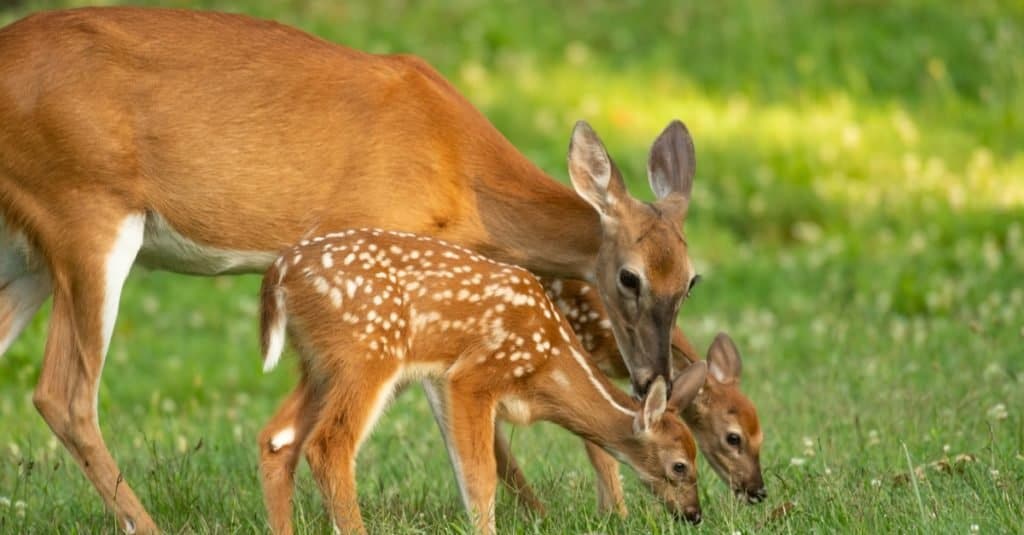
Currently, in Connecticut, it is not illegal to bring a deer carcass from another state if CWD has been documented.
©Tony Campbell/Shutterstock.com
Currently, Connecticut has not spotted any deer with CWD. This disease targets the brain and is fatal in all deer and similar species. It does not currently affect people. However, it does seem to affect some other primates, which is worrisome. In the future, it may jump to people.
Therefore, because of this disease’s 100% fatality rate, many steps are being taken to prevent this disease from spreading. Currently, in Connecticut, it is not illegal to bring a deer carcass from another state if CWD has been documented.
This does not apply to de-boned meat, cleaned skullcap, taxidermy mounts, and hides. Once the animal is processed, the state typically allows you to transport it.
Epizootic Hemorrhagic Disease
On top of chronic wasting disease, Connecticut also has to contend with the epizootic hemorrhagic disease. This disease has been confirmed in Connecticut. Typically, the deer exhibits swollen neck, head, tongue, and eyelids. Bloody discharge may be evident from the deer’s nose. Eventually, the heart and lungs hemorrhage, which causes death.
This condition is spread through biting flies. Therefore, it usually only occurs in the warmer months when these bugs are active. Once the frost kills the bugs that carry the disease, the outbreaks stop naturally.
Because EHD causes high fevers, animals usually hang out around water sources. For instance, one animal tested positive in 2020. However, 20 more deer were found near the water dead in the surrounding areas. Therefore, it is expected that these deer passed due to EHD.
Currently, the state asks hunters to report any suspicious deer behavior that may be linked to EHD.
What to Do After a Deer is Harvested
After you harvest a deer, you have to tag it. Once you fill out the information on your tag, you must keep it with the deer until it is processed. While transporting the deer, you may keep the tag on your person. However, if you leave the deer, the tag must remain with the animal.
You do not have to bring the deer to a check station. Instead, you can simply report the deer online or via phone. Reporting should occur within 24 hours. The website is recommended, as the information may be selected through convenient drop-down menus.
After reporting the kill, you will be given a confirmation number. Then, you may write this number on your harvest tag. This ensures that any officer observing the deer will see that it was reported legally.
You’ll need quite a bit of information to report your animal. Therefore, be sure you have all this information to make a report accurately. For instance, some questions ask how long you hunted and how many deer you observed. It is easiest to keep track of these things while hunting – instead of trying to remember after the fact.
Fines for Not Following Regulations
For the most part, not following regulations is defined as “negligent hunting” in Connecticut. Therefore, the fines and punishments are very similar. However, it depends on the regulation that was broken.
For instance, the first and second degrees both involve injuring another person when accidentally shooting them while hunting.
The third degree involves less-serious crimes. For instance, discharging a weapon outside of a hunting season, hunting on a Sunday, hunting from a vehicle, hitting a building with a projectile, injuring a domestic animal, and hunting on a suspended license fall into this category.
For these crimes, the fine is no less than $200.
Fourth-degree crimes are the “least serious.” Hunting without purchasing a license or permit falls into this category, for instance.
Things start heating up after repeated violations. After getting charged with a violation, any more violations within five years turn the hunter into a “persistent negligent hunter.” In this case, the fine is doubled, and more serious penalties are often applied.
Furthermore, depending on the judge, a hunting license can be suspended after a single violation. After a second violation, hunting licenses are usually suspended for a period of time.
Up Next
The photo featured at the top of this post is © iStock.com/Karel Bock
Sources
- Connecticut's Official State Website, Available here: https://portal.ct.gov/DEEP/Hunting/2022-Connecticut-Hunting-and-Trapping-Guide/Deer-Hunting#additional
- Connecticut's Official State Website, Available here: https://portal.ct.gov/DEEP/Hunting/Tagging-and-Reporting-Deer-and-Turkey-Harvests
- Justia US Law, Available here: https://law.justia.com/codes/connecticut/2005/title53a/sec53a-217e.html
Thank you for reading! Have some feedback for us? Contact the AZ Animals editorial team.



